Hyundai Kona VS Subaru Solterra – Specs, Efficiency & Price Comparison
Which model is the better choice – the Hyundai Kona or the Subaru Solterra? We compare performance (218 HP vs 218 HP), boot capacity (466 L vs 452 L), efficiency (14.60 kWh4.50 L vs 16 kWh), and of course, the price (23100 £ vs 42800 £).
Find out now which car fits your needs better!
The Hyundai Kona (SUV) is powered by a Petrol, Full Hybrid or Electric engine and comes with a Manuel or Automatic transmission. In comparison, the Subaru Solterra (SUV) features a Electric engine and a Automatic gearbox.
When it comes to boot capacity, the Hyundai Kona offers 466 L, while the Subaru Solterra provides 452 L – depending on what matters most to you. If you’re looking for more power, you’ll need to decide whether the 218 HP of the Hyundai Kona or the 218 HP of the Subaru Solterra suits your needs better.
There are also differences in efficiency: 14.60 kWh4.50 L vs 16 kWh. In terms of price, the Hyundai Kona starts at 23100 £, while the Subaru Solterra is available from 42800 £.
Compare all the key specs now and find out which model fits your lifestyle best!
Hyundai Kona
The Hyundai Kona blends a bold design with a versatile interior, making it a standout choice in the compact SUV market. Its crisp handling and responsive steering provide an engaging driving experience, whether in the city or on the open road. The vehicle also offers a range of features designed to enhance comfort and connectivity, ensuring a pleasurable journey for both driver and passengers.
details @ hyundai.news
@ hyundai.news
 @ hyundai.news
@ hyundai.news
 @ hyundai.news
@ hyundai.news
 @ hyundai.news
@ hyundai.news
Subaru Solterra
The Subaru Solterra represents the brand's first venture into the all-electric vehicle market, combining Subaru's renowned all-wheel-drive capabilities with eco-friendly technology. Its sleek and modern design is complemented by a spacious interior, ensuring comfort for both driver and passengers. With a focus on sustainability and innovation, the Solterra is poised to appeal to environmentally conscious consumers seeking adventure without compromising on performance.
details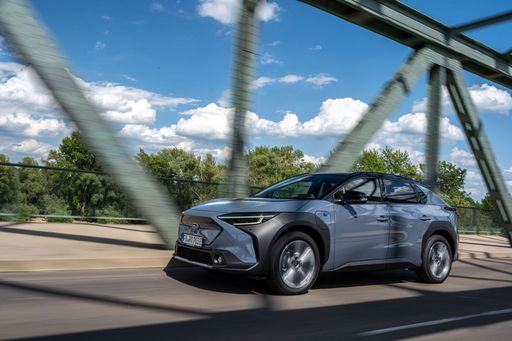 @ Subaru
@ Subaru
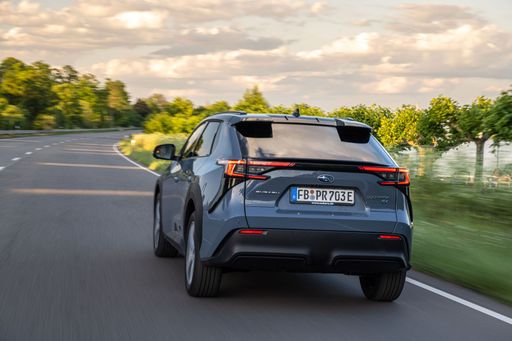 @ Subaru
@ Subaru
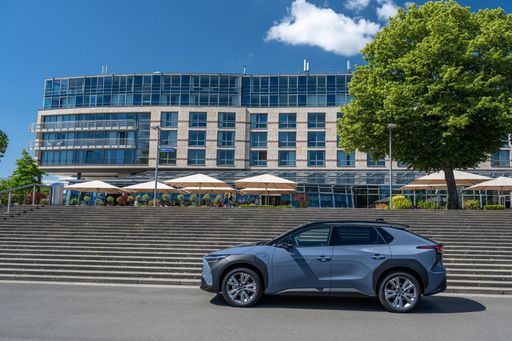 @ Subaru
@ Subaru
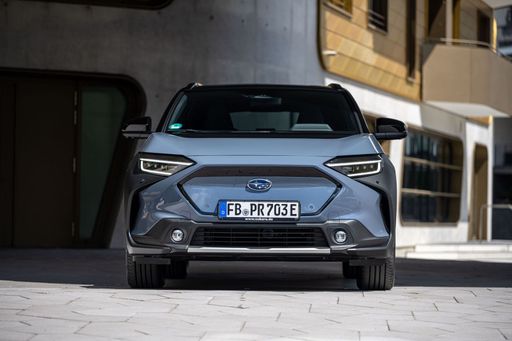 @ Subaru
@ Subaru
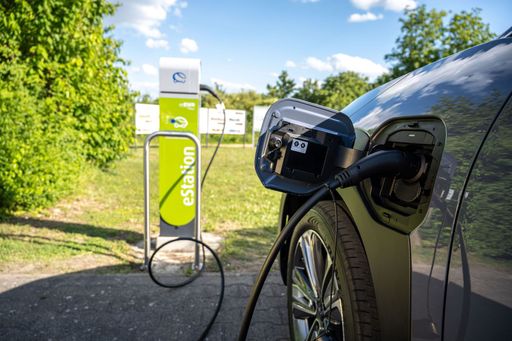 @ Subaru
@ Subaru
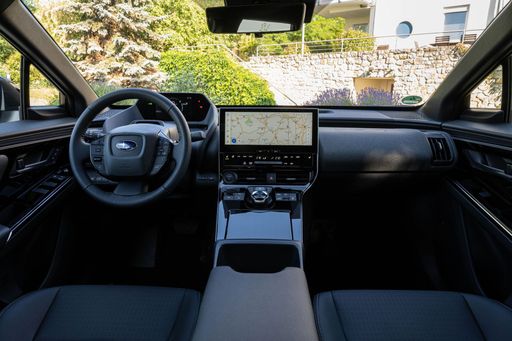 @ Subaru
@ Subaru
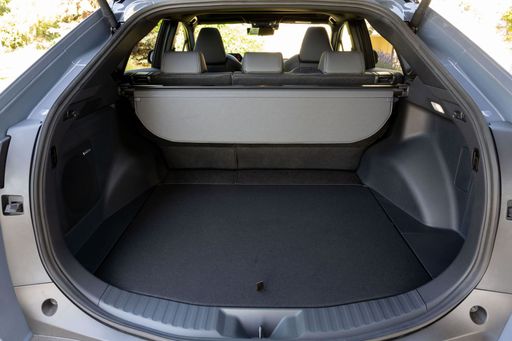 @ Subaru
@ Subaru

|

|
|
|
|
Costs and Consumption |
|
|---|---|
|
Price
23100 - 41600 £
|
Price
42800 - 46200 £
|
|
Consumption L/100km
4.5 - 6.9 L
|
Consumption L/100km
-
|
|
Consumption kWh/100km
14.6 - 16.8 kWh
|
Consumption kWh/100km
16 - 17.9 kWh
|
|
Electric Range
377 - 514 km
|
Electric Range
416 - 466 km
|
|
Battery Capacity
1.3 - 65.4 kWh
|
Battery Capacity
-
|
|
co2
0 - 157 g/km
|
co2
0 g/km
|
|
Fuel tank capacity
38 - 47 L
|
Fuel tank capacity
-
|
Dimensions and Body |
|
|---|---|
|
Body Type
SUV
|
Body Type
SUV
|
|
Seats
5
|
Seats
5
|
|
Doors
5
|
Doors
5
|
|
Curb weight
1370 - 1773 kg
|
Curb weight
2013 - 2057 kg
|
|
Trunk capacity
466 L
|
Trunk capacity
441 - 452 L
|
|
Length
4350 - 4385 mm
|
Length
4690 mm
|
|
Width
1825 mm
|
Width
1860 mm
|
|
Height
1580 - 1585 mm
|
Height
1650 mm
|
|
Payload
420 - 490 kg
|
Payload
493 - 537 kg
|
Engine and Performance |
|
|---|---|
|
Engine Type
Petrol, Full Hybrid, Electric
|
Engine Type
Electric
|
|
Transmission
Manuel, Automatic
|
Transmission
Automatic
|
|
Transmission Detail
Schaltgetriebe, Automat. Schaltgetriebe (Doppelkupplung)
|
Transmission Detail
-
|
|
Drive Type
Front-Wheel Drive, All-Wheel Drive
|
Drive Type
All-Wheel Drive
|
|
Power HP
100 - 218 HP
|
Power HP
218 HP
|
|
Acceleration 0-100km/h
7.8 - 13.3 s
|
Acceleration 0-100km/h
6.90 s
|
|
Max Speed
162 - 208 km/h
|
Max Speed
160 km/h
|
|
Torque
200 - 265 Nm
|
Torque
336 Nm
|
|
Number of Cylinders
3 - 4
|
Number of Cylinders
-
|
|
Power kW
74 - 160 kW
|
Power kW
160 kW
|
|
Engine capacity
998 - 1598 cm3
|
Engine capacity
-
|
General |
|
|---|---|
|
Model Year
2024
|
Model Year
2022
|
|
CO2 Efficiency Class
D, C, E, F, A
|
CO2 Efficiency Class
A
|
|
Brand
Hyundai
|
Brand
Subaru
|
Hyundai Kona
The Hyundai Kona: A Comprehensive Overview
The Hyundai Kona has established itself as a standout in the compact SUV segment, blending innovation with performance and style. As the automotive world moves towards more sustainable and efficient options, the Kona offers a variety of powertrains, from traditional petrol engines to full hybrids and all-electric models.
Powertrain Options and Performance
The Hyundai Kona's powertrain choices cater to a wide range of preferences. For petrol enthusiasts, the Kona offers a 1.0L T-GDI engine, delivering 100 PS, and a more robust 1.6L T-GDI variant with up to 170 PS. Those looking for efficiency without sacrificing power can consider the full hybrid model, offering 129 PS and an impressive consumption of 4.5 L/100km.
For a greener option, the all-electric Kona provides a compelling case. With battery capacities of up to 65.4 kWh, the electric Kona offers power outputs of 156 to 218 PS, and efficiencies as low as 14.6 kWh/100km, enabling an electric range of up to 513 km.
Technical Specifications and Innovations
Built on a robust platform, the Kona delivers versatility and reliability. With a choice between manual or dual-clutch automatic gearboxes, along with options for front-wheel or all-wheel drive, the Kona ensures a tailored driving experience. The handling is enhanced by the car's lightweight construction, balancing a 1370 to 1773 kg curb weight with dynamic performance.
The Kona's design doesn't compromise cargo space for style; it offers a generous 466 L boot capacity. With a relatively compact body, measuring 4350 to 4385 mm in length, the Kona easily navigates urban environments while still commanding a strong road presence with its 1825 mm width.
Efficiency and Eco-Friendliness
Hyundai is committed to reducing emissions, as evidenced by the Kona's CO2 efficiency ratings, which range from class A for electric models to class D for some higher-performance petrol variants. The focus on reducing environmental impact without sacrificing driving pleasure is notable throughout the Kona range.
Costing and Value
The Hyundai Kona offers commendable value for money. Pricing starts at €26,400 and reaches up to €50,690, depending on the chosen configuration. The monthly running costs range from €956 to €1090, with a cost per kilometre of 38.3 to 43.6 cents, making it a competitive option in its class.
Conclusion: Modern, Efficient, and Versatile
The Hyundai Kona stands as a testament to Hyundai's commitment to innovation, efficiency, and practicality. Whether you are inclined towards a traditional combustion engine, a hybrid for a balance of power and efficiency, or a full electric model for maximum eco-friendliness, the Kona provides a tailored solution for each unique driver preference.
Subaru Solterra
Introducing the Subaru Solterra: A New Era in Electric SUV Innovation
The automotive industry is witnessing a remarkable transformation with the rise of electric vehicles. Among the forefront of this movement is the Subaru Solterra, an electric SUV designed to offer both sustainability and performance. In this article, we delve into the technological details and innovations that make the Subaru Solterra a standout choice in the EV market.
Powerful Performance and Efficiency
The Subaru Solterra is powered by an electric motor that delivers a robust 218 PS, translating to approximately 160 kW of power. This impressive output enables the Solterra to achieve a 0-100 km/h acceleration in just 6.9 seconds, positioning it as a swift contender in the electric SUV category.
Efficiency is another hallmark of the Solterra, with a consumption rate of just 16 kWh per 100 km. This efficiency, coupled with a high capacity battery, extends the driving range up to an impressive 466 km on a single charge, making it perfect for both city commutes and longer journeys.
Advanced All-Wheel Drive System
One of the defining features of the Subaru Solterra is its advanced all-wheel drive system, which ensures optimal traction and stability across various terrains. This system is particularly beneficial for drivers who need a vehicle capable of handling poor driving conditions, characteristic of the versatility SUVs are known for.
Innovative Design and Spacious Comfort
The Subaru Solterra doesn’t just impress with its performance; it also stands out with its design and interior. Measuring 4690 mm in length, 1860 mm in width, and 1650 mm in height, the Solterra offers a spacious and comfortable environment for up to five passengers. It’s an embodiment of modern design that does not compromise on space or user comfort.
The SUV provides ample storage with a 452-litre boot space, catering to the needs of families and adventurers alike. It also offers the ‘Comfort’ line of features, ensuring a pleasant driving and riding experience for all.
Commitment to Sustainability
The Subaru Solterra demonstrates a strong commitment to sustainability, boasting a CO2 efficiency rating of Class A. As an all-electric vehicle, it produces zero emissions, highlighting Subaru's dedication to reducing its carbon footprint and promoting a cleaner environment.
Conclusion: A True Leader in the Electric SUV Segment
In summary, the Subaru Solterra is a remarkable addition to the electric vehicle market, promising impressive performance, efficiency, and sustainability. With advanced technological features, a robust all-wheel drive system, and a spacious interior, the Solterra caters to the needs and desires of modern drivers. It represents a significant step forward in Subaru's journey towards an electric future.
The prices and data displayed are estimates based on German list prices and may vary by country. This information is not legally binding.
